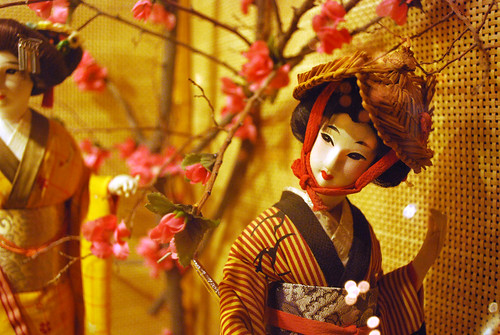
{Photo by rocketlass.}
The quake and tsunami had me thinking inescapably about Japan today. Our friends in the Tokyo suburbs are safe, as are acquaintances we made in the course of our visit there two years ago, but that doesn't significantly lessen the impact of the images of devastation.
Midafternoon, I turned to Lafcadio Hearn, to see if I could get from him some account that would convey how special, and fascinating, yet comfortable Japan felt from the minute we arrived. This, from his Japan: An Attempt at Interpretation (1905) isn't perfect, but it's close:
The majority of the first impressions of Japan recorded by travellers are pleasurable impressions. Indeed, there must be something lacking, or something very harsh, in the nature to which Japan can make no emotional appeal. . . . My own first impressions of Japan,--Japan as seen in the white sunshine of a perfect spring day,--had doubtless much in common with the average of such experiences. I remember especially the wonder and delight of the vision. The wonder and delight have never passed away: they are often revived for me even now, by some chance happening, after fourteen years of sojourn.Then there's this, from Jonathan Cott's Wandering Ghost: The Odyssey of Lafcadio Hearn (1990):
"Here I am in the land of dreams," Lafcadio wrote to Henry Watkin,"--surrounded by strange Gods. I seem to have known and loved them before somewhere." To Elizabeth Bisland he wrote: "I feel indescribably toward Japan. Of course Nature here is not the Nature of the tropics,which is so splendid and savage and omnipotently beautiful that I feel at this very moment of writing the same pain in my heart I felt when leaving Martinique. This is a domesticated nature, which loves man, and makes itself beautiful for him in a quiet grey-and-blue way like the Japanese women, and the trees seem to know what people say about them--seem to have little human souls. What I love in Japan is the Japanese--the poor simple humanity of the country. It is divine."After he'd lived there a while, he would write in Japan: An Attempt at Interpretation about how different the Japanese are from Westerners, a position that's less troubling coming from Hearn, who loved Japan so much he made it his adopted home, than it would be from many another mouth. But it nonetheless feels wrong, a century on: when we visited, the wonder and the delight and beauty he describes were there, unquestionably, and, as with any nation you look at closely, we got the sense that Japanese culture could repay almost infinite attention and study--but the overall feeling was one of welcome. I've never in all my travels been treated as kindly, been shown such courtesy, or given such (often elaborate) assistance as we were as strangers in Tokyo. Kindness and courtesy are to some extent cultural, but that doesn't mean their existence shouldn't be celebrated.
Our thoughts are there.




